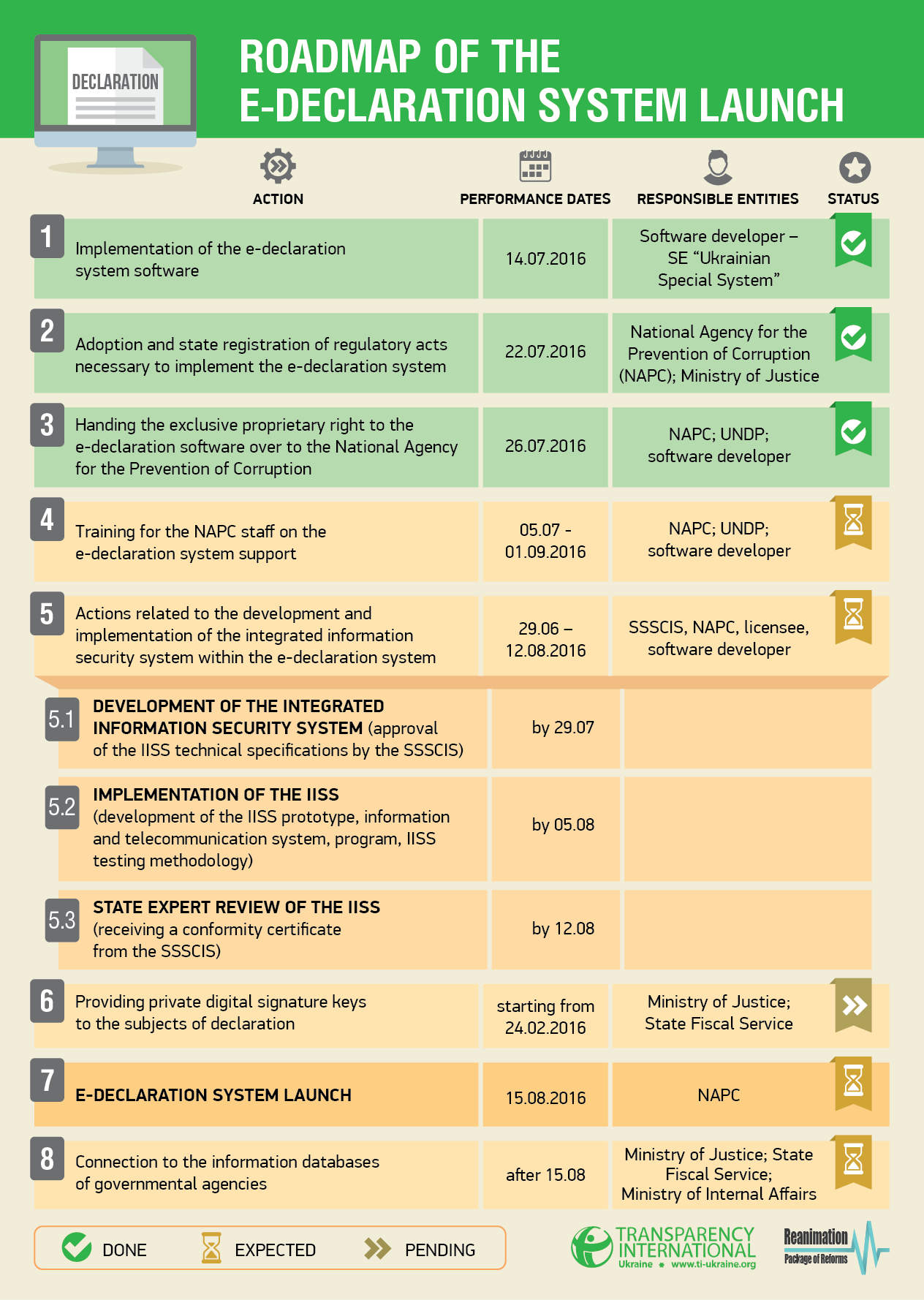According to the National Agency for the Prevention of Corruption (NAPC), the system of electronic declaration of public officials’ assets should be launched in two weeks – on August 15, 2016, when high-ranking government officials, judges, prosecutors and other officials should start filing their electronic declarations into the new system.
This date is indicated in NAPC and Cabinet of Ministers regulation documents and was announced to IMF and the EU. Launching the system is one of the last conditions Ukraine needs to meet in order to receive next IMF tranche and lifting of EU visas.
The software for the system has already been developed. NAPC regulations required for this system came into force upon being registered in the Ministry of Justice on July 22.
the system is endangered by a belated launch;
expertise is to be performed by a dependent body;
functioning of the whole system may be performed only in a test regime, which will make it illegitimate.
Delay of the system launch
A certificate of conformity for an integrated information security system (IISS) in the declaration system should be issued. It is the responsibility of the State Special Communications Service of Ukraine – a central executive body with a special status which is coordinated by the Cabinet of Ministers, but also depends on the President of Ukraine, who confers senior officer ranks to the employees of the Service, the Reanimation Package of Reforms (RPR) explained in an open statement on 2 August.
According to the schedule of the system launch, on Friday, July 29, the State Special Communications Service of Ukraine had to approve the technical specifications and choose a licensed organization to conduct an expert review of the IISS. This has not been done, which jeopardizes timely issue of a certificate of conformity for the electronic declaration system IISS.
Receiving a certificate of conformity for the declaration system is not only as a technical requirement – it is a prerequisite for the legitimate operation of the system, RPR experts explain. Without this certificate, the system can work only in a test mode, which will mean that electronic declarations filed to such a system will have no legal significance. It will be impossible to bring a person to responsibility for inaccurate information in such a declaration.
Appointing dependent experts
Moreover, the State Special Communications Service of Ukraine (SSCSU) is reportedly trying to impose a state-owned company controlled by it as an expert organization. Dmytro Chaplinskyi, Adviser at IMF, informed on 2 August on his Facebook, that a company named State Center of CyberSecurity was recommended as an expert organization despite the fact that it was earlier created by SSCSU itself
“The head of SSCSU pushed this decision in NAPC today. At the same time, he wasn’t able to give answers to the most simple questions regarding: 1) experience of the company in carrying out expertise in such a scale, in particular, amount of work done and time period present on the market; 2) presence of conflict of interests between the expert company and SSCSU,” Chaplinskyi wrote.
RPR stated, that due to the lack of experts, this company will not be able to complete the expert review in time and to ensure a full-fledged functioning of the system (its “production use”) starting from 15 August 2016.
“…the State Center of CyberSecurity was created in the Service (SSCSU – Ed.) only a year ago. [This is] an office, where one may wait for the certificate forever, since only the SSCSU can influence it!” Vitaliy Shabunin from Center of counteraction to corruption wrote in a blog on Ukrainska Pravda.
Killing the legitimacy of e-declaration
All this, Shabunin further argues, turns e-declarations into papers, not documents. “It will be just a paper that won’t be recognized by the court as evidence of the illegal enrichment of a prosecutor, judge, and all who are especially fond of living a grand style with the salary of couple thousand Hryvnas,” he wrote.
Moreover, this would allow officials to even refuse to submit declarations to an unprotected Registry; they will be able to appeal in court the results of property inspection performed by NAPC, as well as challenge the decision of NAPC regarding launching the system, Shabunin stated. He predicted, that on 15 August the system will be launched anyway, “[Prime Minister] Groysman and [President] Poroshenko will receive a lot of PR from imitating a launch of the system, deputies and ministers will rush to post their declaration, though this demonstrative virtual transparency will have nothing in common with the real legal framework.”
That means, despite launching the system of e-declarations, corrupt officials will still not be brought to responsibility for lying in the declarations or refusing to declare at all.
“Perhaps this is what the senior public officials are trying to achieve with the help of the State Special Communications Service of Ukraine?” RPR questioned in their statement and called on the President of Ukraine, the Government of Ukraine, the National Agency for the Prevention of Corruption, and the State Special Communications Service of Ukraine “to ensure timely and proper launch of the system of electronic declarations – to guarantee that this system is in production use starting from 15 August 2016, using an integrated information security system with a certificate of conformity issued by the State Special Communications Service of Ukraine.”








